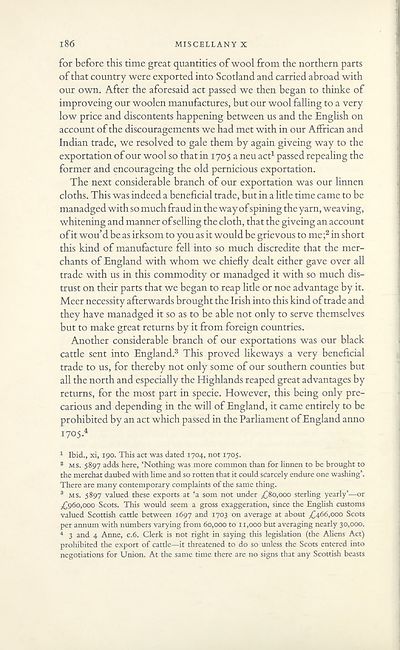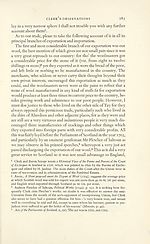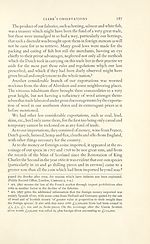Series 4 > Miscellany of the Scottish History Society
(211) Page 186
Download files
Complete book:
Individual page:
Thumbnail gallery: Grid view | List view

i86
MISCELLANY X
for before this time great quantities of wool from the northern parts
of that country were exported into Scotland and carried abroad with
our own. After the aforesaid act passed we then began to thinke of
improveing our woolen manufactures, but our wool falling to a very
low price and discontents happening between us and the English on
account of the discouragements we had met with in our Affrican and
Indian trade, we resolved to gale them by again giveing way to the
exportation of our wool so that in 1705 a neu act1 passed repealing the
former and encourageing the old pernicious exportation.
The next considerable branch of our exportation was our linnen
cloths. This was indeed a beneficial trade, but in a litle time came to be
manadged with so much fraud in the way of spining the yarn, weaving,
whitening and manner of selling the cloth, that the giveing an account
of it wou’d be as irksom to you as it would be grievous to me ;2 in short
this kind of manufacture fell into so much discredite that the mer¬
chants of England with whom we chiefly dealt either gave over all
trade with us in this commodity or manadged it with so much dis¬
trust on their parts that we began to reap litle or noe advantage by it.
Meer necessity afterwards brought the Irish into this kind of trade and
they have manadged it so as to be able not only to serve themselves
but to make great returns by it from foreign countries.
Another considerable branch of our exportations was our black
cattle sent into England.3 This proved likeways a very beneficial
trade to us, for thereby not only some of our southern counties but
all the north and especially the Highlands reaped great advantages by
returns, for the most part in specie. However, this being only pre¬
carious and depending in the will of England, it came entirely to be
prohibited by an act which passed in the Parliament of England anno
1705.4
1 Ibid., xi, 190. This act was dated 1704, not 1705.
2 ms. 5897 adds here, ‘Nothing was more common than for linnen to be brought to
the merchat daubed with lime and so rotten that it could scarcely endure one washing’.
There are many contemporary complaints of the same thing.
3 ms. 5897 valued these exports at ‘a som not under £80,000 sterling yearly’—or
£960,000 Scots. This would seem a gross exaggeration, since the English customs
valued Scottish cattle between 1697 and 1703 on average at about £466,000 Scots
per annum with numbers varying from 60,000 to 11,000 but averaging nearly 30,000.
4 3 and 4 Anne, c.6. Clerk is not right in saying this legislation (the Aliens Act)
prohibited the export of cattle—it threatened to do so unless the Scots entered into
negotiations for Union. At the same time there are no signs that any Scottish beasts
MISCELLANY X
for before this time great quantities of wool from the northern parts
of that country were exported into Scotland and carried abroad with
our own. After the aforesaid act passed we then began to thinke of
improveing our woolen manufactures, but our wool falling to a very
low price and discontents happening between us and the English on
account of the discouragements we had met with in our Affrican and
Indian trade, we resolved to gale them by again giveing way to the
exportation of our wool so that in 1705 a neu act1 passed repealing the
former and encourageing the old pernicious exportation.
The next considerable branch of our exportation was our linnen
cloths. This was indeed a beneficial trade, but in a litle time came to be
manadged with so much fraud in the way of spining the yarn, weaving,
whitening and manner of selling the cloth, that the giveing an account
of it wou’d be as irksom to you as it would be grievous to me ;2 in short
this kind of manufacture fell into so much discredite that the mer¬
chants of England with whom we chiefly dealt either gave over all
trade with us in this commodity or manadged it with so much dis¬
trust on their parts that we began to reap litle or noe advantage by it.
Meer necessity afterwards brought the Irish into this kind of trade and
they have manadged it so as to be able not only to serve themselves
but to make great returns by it from foreign countries.
Another considerable branch of our exportations was our black
cattle sent into England.3 This proved likeways a very beneficial
trade to us, for thereby not only some of our southern counties but
all the north and especially the Highlands reaped great advantages by
returns, for the most part in specie. However, this being only pre¬
carious and depending in the will of England, it came entirely to be
prohibited by an act which passed in the Parliament of England anno
1705.4
1 Ibid., xi, 190. This act was dated 1704, not 1705.
2 ms. 5897 adds here, ‘Nothing was more common than for linnen to be brought to
the merchat daubed with lime and so rotten that it could scarcely endure one washing’.
There are many contemporary complaints of the same thing.
3 ms. 5897 valued these exports at ‘a som not under £80,000 sterling yearly’—or
£960,000 Scots. This would seem a gross exaggeration, since the English customs
valued Scottish cattle between 1697 and 1703 on average at about £466,000 Scots
per annum with numbers varying from 60,000 to 11,000 but averaging nearly 30,000.
4 3 and 4 Anne, c.6. Clerk is not right in saying this legislation (the Aliens Act)
prohibited the export of cattle—it threatened to do so unless the Scots entered into
negotiations for Union. At the same time there are no signs that any Scottish beasts
Set display mode to:
![]() Universal Viewer |
Universal Viewer | ![]() Mirador |
Large image | Transcription
Mirador |
Large image | Transcription
Images and transcriptions on this page, including medium image downloads, may be used under the Creative Commons Attribution 4.0 International Licence unless otherwise stated. ![]()
| Scottish History Society volumes > Series 4 > Miscellany of the Scottish History Society > (211) Page 186 |
|---|
| Permanent URL | https://digital.nls.uk/126695415 |
|---|
| Description | Over 180 volumes, published by the Scottish History Society, containing original sources on Scotland's history and people. With a wide range of subjects, the books collectively cover all periods from the 12th to 20th centuries, and reflect changing trends in Scottish history. Sources are accompanied by scholarly interpretation, references and bibliographies. Volumes are usually published annually, and more digitised volumes will be added as they become available. |
|---|


